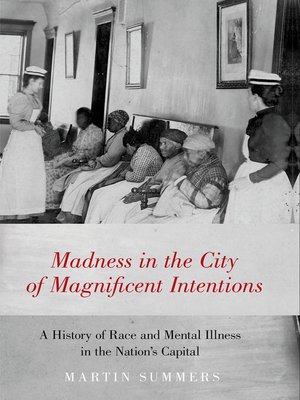Madness in the City of Magnificent Intentions
ebook ∣ A History of Race and Mental Illness in the Nation's Capital
By Martin Summers

Sign up to save your library
With an OverDrive account, you can save your favorite libraries for at-a-glance information about availability. Find out more about OverDrive accounts.
Find this title in Libby, the library reading app by OverDrive.



Search for a digital library with this title
Title found at these libraries:
| Library Name | Distance |
|---|---|
| Loading... |
From the mid-nineteenth to the late twentieth centuries, Saint Elizabeths Hospital was one of the United States' most important institutions for the care and treatment of the mentally ill. Founded in 1855 to treat insane soldiers and sailors as well as civilian residents in the nation's capital, the institution became one of the country's preeminent research and teaching psychiatric hospitals. From the beginning of its operation, Saint Elizabeths admitted black patients, making it one of the few American asylums to do so. This book is a history of the hospital and its relationship to Washington, DC's African American community. It charts the history of Saint Elizabeths from its founding to the late-1980s, when the hospital's mission and capabilities changed as a result of deinstitutionalization, and its transfer from the federal government to the District of Columbia. Drawing on a wide variety of sources, including patient case files, the book demonstrates how race was central to virtually every aspect of the hospital's existence, from the ways in which psychiatrists understood mental illness and employed therapies to treat it to the ways that black patients experienced their institutionalization. The book argues that assumptions about the existence of distinctive black and white psyches shaped the therapeutic and diagnostic regimes in the hospital and left a legacy of poor treatment of African American patients, even after psychiatrists had begun to reject racialist conceptions of the psyche. Yet black patients and their communities asserted their own agency and exhibited a "rights consciousness" in large and small ways, from agitating for more equal treatment to attempting to manage the therapeutic experience.







